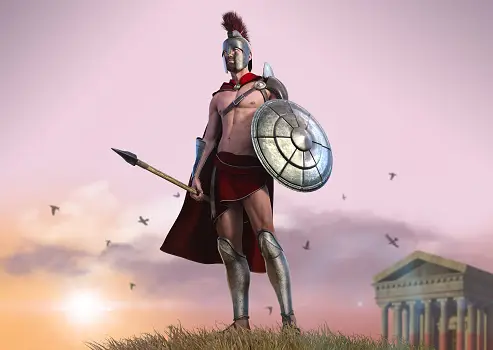Religion and spirituality have historically played a pivotal role in the lives of ancient warriors across various cultures, significantly influencing their motivations, ethics, and the strategies they employed in warfare. For these warriors, religion was not just a set of personal beliefs but a comprehensive system that permeated every aspect of their lives, including their approach to battle. This essay explores the multifaceted influence of religion and spirituality on some of the
greatest ancient warriors, drawing from diverse cultures around the world.
The Spiritual Warrior Ethos
In many ancient societies, the concept of the warrior was deeply intertwined with religious and spiritual beliefs. These beliefs provided a framework that justified warfare, offered moral guidance, and motivated warriors with promises of honor or rewards in the afterlife. The spiritual warrior ethos often emphasized virtues such as bravery, honor, and sacrifice, which were seen as conduits to divine favor or immortal glory.
Religion as a Motivational Force
For ancient warriors, religion often served as a profound motivational force. The belief in divine favor or protection in battle encouraged warriors to face overwhelming odds with courage. In Norse mythology, the Valkyries selected the most valiant warriors slain in battle to reside in Valhalla, where they would fight by day and feast by night until the Ragnarok. Similarly, Islamic warriors were motivated by the promise of paradise for those who fell in battle defending their faith, a belief that provided both courage and consolation.
Religious Rituals and War
Before embarking on military campaigns, it was common for ancient warriors to seek divine support through rituals, sacrifices, and oracles. The Romans, for example, placed great importance on the auspices and sacrifices to secure the gods’ favor before battles. The Aztecs engaged in ritual warfare partly to capture prisoners for human sacrifice, believing this appeased their gods and ensured cosmic balance and the continuation of the world.
Divine Strategy and Guidance
Ancient warriors often sought divine guidance for their military strategies. In ancient Greece, the Oracle of Delphi played a crucial role in advising leaders on military matters. Leaders like Alexander the Great were known to consult oracles and interpret omens before major battles, believing that success was partly determined by aligning their actions with the will of the gods.
Religion and Warrior Identity
Religious beliefs were integral to the identity of ancient warriors, often dictating the code by which they lived and died. The Bushido code of the Samurai integrated Zen Buddhism, Confucianism, and Shinto to create a framework that emphasized loyalty, frugality, martial arts mastery, and honor unto death. For the Samurai, death in the service of a righteous cause was considered an honorable end that reflected their deep spiritual convictions.
Moral and Ethical Constraints
Religion and spirituality also provided a moral compass that guided the conduct of ancient warriors, offering ethical constraints on their behavior in and out of battle. The concept of dharma in Hinduism, for example, played a significant role in the Mahabharata, where warriors were bound by their duty to righteousness, influencing their conduct in warfare. In Christian Europe, the concept of the Just War theory emerged, which sought to reconcile Christian teachings with the necessity of war under certain conditions, imposing moral guidelines on combatants.
The Role of Deities and Mythical Figures
Deities and mythical figures often served as models for ancient warriors, embodying the ideals and virtues to which they aspired. Greek warriors idolized Achilles, whose prowess and fate were intimately tied to the gods. Celtic warriors revered figures like Cú Chulainn, whose semi-divine heritage and feats in battle underscored the close relationship between the warrior and the spiritual realms.
Conclusion
The role of religion and spirituality in the lives of ancient warriors was complex and profound, influencing their motivations, actions, and understanding of their place in the world. These beliefs provided not just a framework for ethical conduct and valor but also a source of comfort and meaning in the face of the brutal realities of war. Through rituals, divine guidance, and a deeply ingrained spiritual ethos, religion and spirituality shaped not only the individual warrior but also the larger military strategies and outcomes of ancient societies. As we reflect on these ancient warriors, we gain insights into the power of belief to shape human behavior, particularly in the context of conflict and warfare, a theme that resonates across cultures and epochs.



